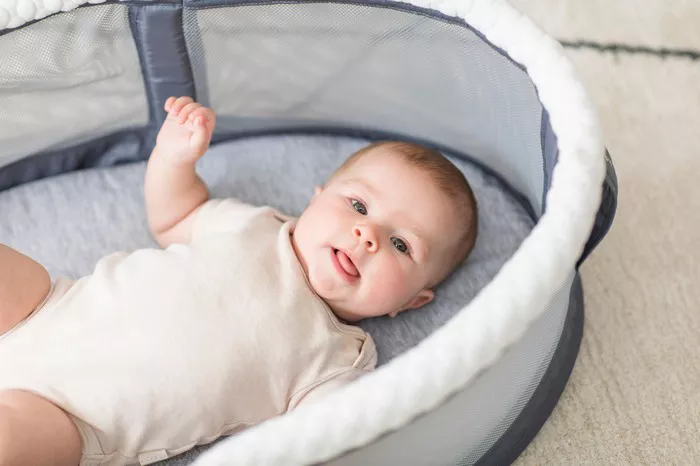In the realm of parenthood, myriad decisions await, each laden with considerations of safety, comfort, and practicality. Among these decisions, choosing the right sleeping arrangement for your newborn stands as one of the most pivotal. Enter the bassinet: a compact, cozy sleeping space designed specifically for infants in their early months. While the purpose of a bassinet may seem straightforward at first glance, its utility extends far beyond mere slumber facilitation. In this comprehensive guide, we delve into the multifaceted roles of bassinets, exploring their benefits, safety features, and practical applications.
Understanding the Purpose of Bassinets
At its core, a bassinet serves as a specialized sleeping area tailored to meet the unique needs of newborns and young infants. Unlike cribs or cradles, bassinets offer a snug and enclosed environment that mimics the womb, providing infants with a sense of security and comfort during their transition from prenatal to postnatal life. The compact size of bassinets makes them particularly suitable for placement in the parent’s bedroom, fostering close proximity for nighttime feedings and soothing.
Promoting Safe Sleep Practices
One of the primary functions of a bassinet is to promote safe sleep practices, thereby reducing the risk of Sudden Infant Death Syndrome (SIDS) and other sleep-related accidents. Bassinets are designed with specific safety features, such as firm mattresses, breathable mesh sides, and sturdy construction, to create a secure sleeping environment for infants. Additionally, their small size and portability allow parents to keep their baby nearby while adhering to the American Academy of Pediatrics’ recommendation for room-sharing without bed-sharing.
Facilitating Bonding and Accessibility
Beyond safety considerations, bassinets play a crucial role in facilitating bonding between parents and infants. By keeping the baby within arm’s reach throughout the night, bassinets enable convenient feeding, comforting, and monitoring without the need to leave the comfort of the bed. This close proximity fosters a sense of security and attachment, promoting healthy emotional development for both the infant and the caregiver.
Supporting Daytime Naps and Supervised Rest
While nighttime sleep is undoubtedly a primary focus, bassinets also serve as a convenient spot for daytime naps and supervised rest periods. Their lightweight and portable design allow parents to move the bassinet from room to room, ensuring that the baby can nap comfortably while remaining under constant supervision. This flexibility is especially valuable for parents seeking to establish a consistent sleep routine for their infant while attending to other household tasks or activities.
Transitioning to Independent Sleep Spaces
As infants grow and develop, the time inevitably comes to transition from the bassinet to a more permanent sleep space, such as a crib or toddler bed. Bassinets play a pivotal role in this transition process by providing a gentle segue from the confined space of the womb to the openness of a larger sleep environment. By gradually acclimating infants to sleeping independently, bassinets help pave the way for a smooth and successful transition, minimizing disruptions to sleep patterns and promoting self-soothing skills.
Accommodating Special Needs and Medical Considerations
In addition to serving as a standard sleep solution for healthy newborns, bassinets also play a crucial role in accommodating special needs and medical considerations. For premature infants or those with medical conditions requiring close monitoring, bassinets equipped with advanced features such as integrated monitoring systems or adjustable inclines may be necessary. These specialized bassinets provide a safe and supportive environment tailored to the unique needs of medically fragile infants, ensuring optimal care and comfort.
Enhancing Travel Convenience
Beyond the confines of the home, bassinets prove invaluable companions for travel and outings with a newborn. Many modern bassinets feature collapsible frames, lightweight construction, and travel-friendly designs, making them ideal for use on road trips, vacations, or visits to family and friends. Whether staying in a hotel room, camping under the stars, or simply spending a day at the park, having a familiar sleep environment can greatly enhance the comfort and security of the infant, ensuring restful nights and peaceful adventures for the entire family.
Conclusion
In conclusion, bassinets serve as versatile and indispensable sleep solutions for newborns and young infants, offering a myriad of benefits that extend beyond mere slumber facilitation. From promoting safe sleep practices and fostering bonding between parents and infants to supporting daytime naps and accommodating special needs, bassinets play a vital role in the early stages of parenthood. By understanding the multifaceted roles of bassinets and selecting a model that aligns with your specific needs and preferences, you can provide your baby with a safe, comfortable, and nurturing sleep environment that sets the foundation for healthy growth and development.


